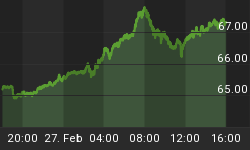Wall Street and Washington have summarily dismissed the recent spate of disappointing economic data by claiming it is solely based upon the weather. The equity market is 100% convinced that winter is to blame for the faltering economy; and that even if stocks have it all wrong, Ms. Yellen and co. will immediately print enough money to make everything ok.
For example, Industrial Production fell 0.3% and Retail Sales dropped 0.4% in January. Also, the last two Non-Farm Payroll reports came in far below estimates, and there were just 113k net new jobs created last month. Especially interesting in this latest report was that 48k construction jobs were added in January. This is totally contradictory to the claims that the anemic employment growth was caused by bad weather.
In addition, December Durable Goods contracted 4.3%, while the housing market is also showing signs of weakness. The Index of Pending Home Sales dropped 8.7%--to over a two-year low--while Home Builder Sentiment in February posted its largest drop in history. Maybe that explains why Housing Starts fell 16% in January to the lowest level since September, which was also the largest drop since February 2011. Staying on housing, Existing Home sales dropped 5.1% in January, hitting their lowest levels since July 2012. Don't look for the weather as an explanation here either; sales in the West dropped 7.3% where there wasn't even a drop of precipitation.
Colder than normal weather may account for some of the decline in U.S. GDP. However, it cannot explain the problems currently being experienced in economies all over the globe.
Japan's GDP fell to a 1% growth rate in Q4; a far cry from the 3% predicted by most economists. The trade deficit hit a record 11.5 trillion Yen for 2013, nearly twice the level of 2012. This is despite (or perhaps because of) the BOJ printing its currency at a 70 trillion Yen annual pace.
China's economic data shows that not only has the economy slowed from its prior double-digit pace, but news out from the National Bureau of Statistics showed the official Non-manufacturing Purchasing Managers' Index fell to 53.4 in January, from 54.6 in December. That reading is the lowest since December 2008.
The economy in Turkey is emblematic of the turmoil in emerging markets. A tumbling currency, soaring interest rates and a plunging stock market are sending the country into chaos. The Borsa Istanbul 100 Index is down 30% since its peak on May 22 of 2013. It just so happens that the fist mention of the Fed's taper of asset purchases also occurred on May 22nd during Mr. Bernanke's testimony before Congress -- far before any snowflakes started to fall.
It may come as a shock to main stream economists that it is cold and snowy in the North-Eastern United States during the December-February time frame. However, worse than expected winter weather in certain parts of the U.S. cannot adequately account for stumbling GDP across the developed world and crumbling securities in emerging markets.
The truth is that global economies are being whipsawed between inflation and deflation, as central banks and governments have created massive debt and asset bubbles. Then, once the stimulus begins to be removed, those bubbles burst. These same governments attempt to re-inflate the same bubbles by monetizing an ever-increasing amount of government debt, causing the asset bubbles to become more pronounced with each cycle.
The resulting instability is causing dizzying swings in most markets and economies. Therefore, it is not the meteorological storm that is to blame for slowing global growth, but rather the destructive forces that result from the clash between the intensifying forces of inflation and deflation. The historic magnitude of these boom and bust cycles are directly caused by the unprecedented manipulation of markets by world governments.
Growth in the U.S. is slowing, along with Asia and Emerging market economies. This is occurring under the context of a continued reduction of Fed asset purchases. Meanwhile, U.S. market strategist are busy looking at the weather charts trying to find excuses. Nevertheless, look for the instability in global currencies, markets, interest rates and economies to worsen as the Fed's taper progresses.















